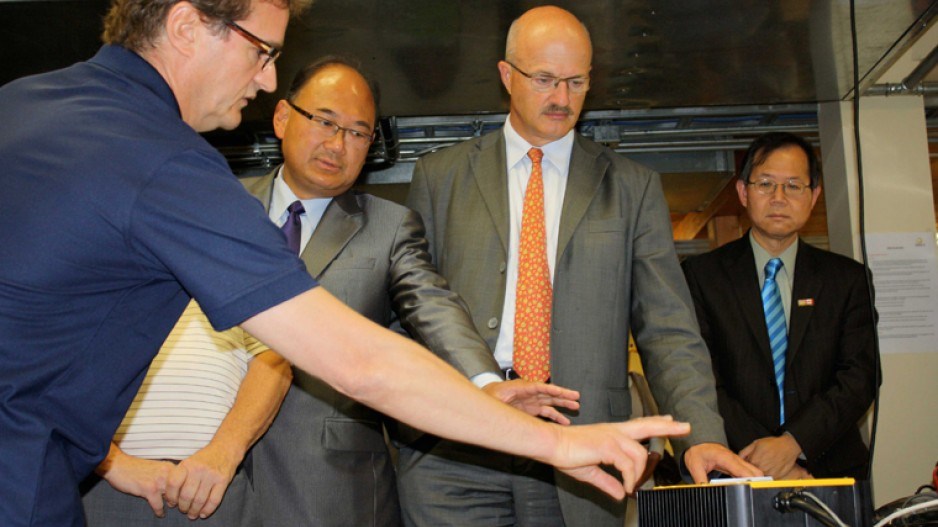The B.C. government will adopt a preferential procurement policy aimed at supporting made-in-B.C. technology and provide $7 million to help high-tech companies access scientists at B.C. universities under a new technology strategy announced Friday.
Pat Bell, minister of jobs, tourism and innovation, said the new procurement strategy will be modelled on the B.C. Wood First policy, which requires wood to be used as a building material in provincial construction projects whenever possible.
“We want to open that door to the technology industry,” Bell said at a press conference at the headquarters of Delta-Q Technologies Corp.
Delta-Q is one of B.C.’s high-tech success stories. The Burnaby-based company makes components that convert AC power to DC for charging batteries in electric vehicles.
Founded in 1999, the company got its first funding from the B.C. government. It has nearly doubled its workforce since 2010 – from 40 to 70 staff – and has shipped close to one million convertors worldwide.
The government’s new technology strategy focuses largely on commercialization. The plan includes efforts to help companies attract later-stage venture capital. It also would provide $12 million per year through the Clean Energy Fund to support clean technology development and includes a policy of adopting natural gas, electricity and hydrogen fuel cells in the transportation sector.
A new $7 million voucher program would be used to allow companies to access graduate students at B.C. universities to help them with research and development. The strategy also focuses on expanding markets internationally for B.C. technology.
Bill Tam, CEO of BC Technology Industry Association, welcomed the strategy, saying it signals the B.C. government is starting to pay more attention to B.C. technology sector.
But Spencer Chandra Herbert, NDP critic for tourism, culture and the arts, said the strategy is lacking in any plan to stop Vancouver game and animation sectors losing talent to places like Montreal and Toronto – the latest being the planned closure of Rockstar Games’ Vancouver studio to expand its Toronto studio.
“In a week when we saw Rockstar Games shut down and move to Ontario, you would think that a technology strategy would have some answers for what’s been going on in the video game world,” he said.
DigiBC president Howard Donaldson agreed there’s not much in the strategy that addresses the problem of the west-to-east brain drain.
“I am sure [the strategy] will help some of the sectors,” he said. “However, these strategies are unlikely to help the economic impacts in the local games sector. To do so, B.C. would have to offer real economic competitive benefits to compete with Ontario, Quebec and other areas throughout the world.”
To get a better understanding of the B.C. film, TV and digital media industries and its challenges and needs, the B.C. government and a consortium of associations, including DigiBC and British Columbia Film + Media, recently launched MediaScreen, a comprehensive study of the sector.
All B.C. companies involved in digital media, film and TV are being asked to participate in the online survey.




